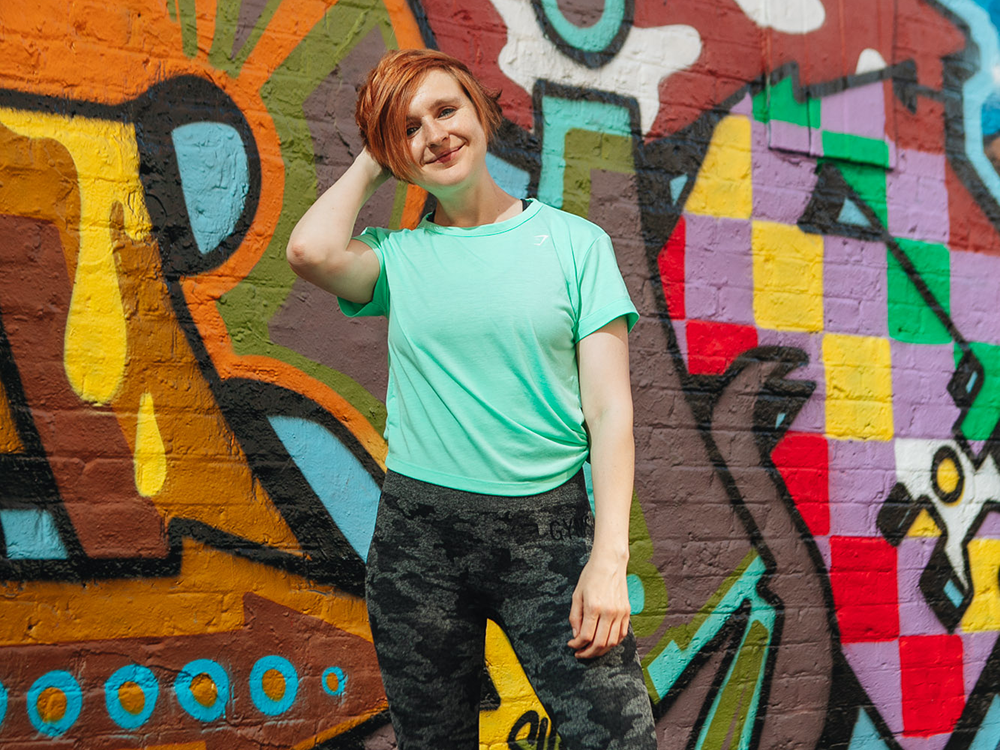“Speak sweetly and positively to yourself like you would your child or parent,” shares one health and wellness founder.
14 min read
This story originally appeared on Authority Magazine
Who doesn’t like to feel healthier and more energectic? We all know in the back of our minds that we will feel better if we exercise more and watch what we eat — but sometimes huge commitments feel too difficult and don’t stick.
Authority Magazine recently ran a series interviewing more than 200 “Women In Wellness.” In the series, the interviewees were asked to share their best “lifestyle tweaks” or small lifestyle changes that can make us feel much better, without requiring huge changes to our current lifestyle.
In the story below are ten enriching highlights from the interviews.
These interviews have been edited for length and clarity.
Alison Hadden (VP of MINDBODY)

Image credit: via Authority Magazine
- Schedule wellness like you would meetings. With a busy work schedule, doctor appointments and our two dogs, my days are pretty hectic. In order to make sure I keep my physical health a top priority, I schedule in wellness like I would a meeting or conference call. I book my workouts and self-care appointments a few weeks out and then I do everything I can to protect those times. In this way, I set myself up for success and I’m reminded that my health and well-being is just as important as anything else on my work schedule.
- Use tech to help disconnect. Staying calm and composed amidst the external noise of day-to-day life can be a challenge. From alerts on my watch that remind me during the workday to stop and breathe, to meditation apps that I use at night before bed to wind down — technology is already fully integrated into my life, so I try and use it to my advantage.
- Sit less! I recently turned on activity notifications that use gamification to remind me to move if I’ve been sedentary for too many minutes. From sitting in meetings and being in front of a computer for most of my day, I rely on my standing desk and these alerts to ensure I’m not hunched over my laptop for longer than an hour at a time. I laughed at first, but now I’ll find myself hopping up during a meeting to just shake it out for a few minutes so that I can get credit towards my daily standing goal.
Sue Glasscock (Co-Founder of The Ranch)

Image credit: via Authority Magazine
- Spend time in nature each and every day. It’s easy to get caught up in the latest “trendy” solutions whether it’s an app, diet, pill or laser. Most of us look for the quick fix, so if that is you, look no further than nature. The incredible abilities of nature to heal and support the mind and body include:
– Improving performance on creative and problem-solving tasks
– Lowering mental distress and incidence of death and disease
– Enhancing educational performance
– Decreasing blood pressure, heart rate and level of stress hormones
– Increasing short-term memory and other attention skills - Take 10 minutes a day to shut out all the extra “noise.” We get bombarded by continual texts, emails, tweets, etc. Our minds, bodies and souls are not meant for this continued assault. It can lead to overstimulation, exhaustion and just plain irritation. It’s proven that meditation, prayer or just being aware of your breath for 10 minutes each day helps alleviate these agitations. Put down your phone, shut your computer and take 10 minutes a day to calm your mind. Bonus points if you combine with tip No. 1 and spend these precious moments in nature.
- Be your own best advocate. Don’t let your mind dwell on the cookie you ate, rejoice in the yoga, veggies and the sleep from yesterday. Our minds can only process one thing at a time. Speak sweetly and positively to yourself like you would your child, friend or parents.
Emily Tills (MS, RD, CDN)

Image credit: via Authority Magazine
- Hydration — if we aren’t hydrated, our bodies will not function properly. In every reaction within the body, water is needed, so when we don’t have enough in our system, we have to use what we have stored up, which results in a less efficient system. If we aren’t hydrated, we have less energy, tend to be hungrier more often and will see less change in the scale.
- Limit your screen time — This goes hand and hand with walking more and self-care. The blue light in the screen causes stress on our eyes, what we are seeing on our screens can cause emotional stress and physical stress, too. When you put your phone down or step away from the computer or TV, you get more active which can help you as well!
- Ask for help — We can’t do it alone. There’s no shame in asking for help. This can be help at work if you’re feeling overwhelmed, help with house chores, help with your emotional state. You don’t have to go it alone, and with someone by your side, you’ll get farther faster.
- Practice self-care — Self-care is a big buzz word now, but it doesn’t have to mean dropping $500 on a beauty product. Self-care can be anything that helps you relax and de-stress. It will help lower cortisol levels (the stress hormone) and make weight loss easier. Try journaling, having your favorite cup of tea, go on a walk, go to bed earlier; anything that helps you wind down.
- Get moving — As a nation, we are not active enough. In fact, a few years ago Fitbit changed the automatic step goal from 10,000 steps to 8,000 steps. That’s about one less mile a day and with that, there’s less excess energy usage in the body. If you’re not able to hit 10,000 steps a day, start with trying to increase your steps by about 1,000 steps until you’re consistently hitting it and then up it again. Any way you can increase your activity — do it!
Njabulo Sithole (CEO of Omame Investments and The Resilience Institute of South Africa)

Image credit: via Authority Magazine
- I believe the wellness journey starts from within; it requires acknowledging the role of self-care and self-love. Our minds have the capacity to choose which thoughts to focus on so we need to skillfully choose the thoughts that will help us achieve a thriving lifestyle. I believe in a meaningful daily mantra that becomes your drive and your center of power to keep you on the course. I believe in this quote, “I can do all things possible if I set my mind on it.” This may be a common quote, but the value lies in answering the question, “Where does my source of power lie?” It is within me! Thus, I can do all things with the right mindset.
- The human body is a system with different functions. If one function of the system is not working optimally, all other functions will be affected. The “resilience philosophy” draws a lot from that idea as we aim to impact the mind, body, heart and soul. So, my second well-being tweak relates to physical activity. Research has shown that there are many benefits for engaging in physical fitness such as improved sleep, increased release of happy hormones “endorphins” and reduction in the stress hormone” cortisol.” Physical activities like running also often facilitate interaction with other people who have the same goals as you, and this brings about a sense of belonging. Lastly, through goal attainment one’s self-esteem improves which positively impacts other areas in life.
- And finally, I believe in self-love, however self-love without the “other” can be a source of unhappiness. This means you should not solely focus on yourself but also aim to help others; love yourself enough to be able to do things beyond the self. This could be your higher purpose — which is close to your soul and drives your spirit. I also believe that each of us is born with a life purpose; it’s already there. This is like gold that you need to mine. There are many ways to discover your life purpose. Some people find that after experiencing a trauma or tragedy they are clear about what brings them the most joy, while others focus on what they really love to do and what comes easily to them.
Emma Green (Founder of Fun Food and Fitness)

Image credit: via Authority Magazine
- Only exercise for fun: Rather than being obsessed with what is optimal, focus on the exercise that is fun for you. Think about the activities that you used to enjoy when you were younger and see if you can find ways to incorporate them now. Perhaps grab a friend if working out on your own seems boring or intimidating, it can be a great way to connect.
- Learn to say “no”: As a recovering people-pleaser, I understand how hard it is to say no when you are asked to do something. It is so important to guard your own time, energy and well-being. If something is not worth doing, say no. If you don’t feel comfortable saying no right away, say, “I’ll have to think about it,” and go back to that person at a later date. That gives you the time and space to decide what you are going to say to them and means that they will not be expecting an unequivocal yes.
Angelica Ventrice (CEO of Fit for Life)

Image credit: via Authority Magazine
- Eat real food. Real food doesn’t have ingredients, they are the ingredients. I know that may sound basic but this is key to improving your well-being. The less label-reading we are doing, and the less processed food we are consuming, the better we will look and feel.
- Do not look at your phone first thing in the morning. Many people begin their day by checking their emails and messages; this puts ours brain in a reactive and comparison mode. This is so detrimental to our mental health. If we start our mornings by checking our phones, we are willingly starting our day off on someone else’s terms. Instead, begin each morning with a 10-minute meditation, stretching or journaling activity. It will completely change the tone of your day. Most likely, you will feel calmer, less reactive and less stressed.
- Go for progress over perfection. Many times people think they need to be perfect on their journeys to achieve success, and this is simply not true. Having one cupcake does not completely derail all of your hard work. Just like one workout doesn’t make you fit. Stay consistent and persistent and remember that small tweaks such as eliminating some dairy or eating more veggies daily, lead to big results.
- Schedule everything. This may sound extreme but I always teach this in my program: What gets scheduled gets done. Make a schedule and have a plan. Don’t just wing it. Winging your workouts doesn’t produce results; neither does eating on-the-go because you did not schedule in time to meal prep and therefore end up reaching for fast food. Take 20 minutes of your Sundays to schedule out your workouts, your meditation, time with your children or partner, meal preparation, self-care activities etc., for the week. Along with scheduling, have a solid strategy. What workouts will you be doing? What meals will you make this week? When is your recovery day? What can you tackle on your to-do list that you have been putting off?
Katy Lush (Founder of Chicago River North Pilates & Lush Living)

Image credit: via Authority Magazine
- Make a dynamic work station — We all need to maximize productivity, and there are simple, easy ways to stay active while working. Alternating between a standing desk and a floor desk changes your work space to provide more movement opportunities. When you’re standing, you can stretch your feet with a massage ball, stand on a boot tray filled with stones to work out stiff feet or use a half foam roller to mobilize your calves.
- Carry heavy things — When you’re grocery shopping, forgo the cart and carry items in a basket. If that’s too heavy, carry one heavy thing from your cart while pushing it with the other arm to strengthen your upper body and core. Another way to strengthen your arms, if you have kids, is to carry them instead of using a stroller. Carrying heavy things throughout your day means you don’t need to take an extra class at the gym to focus on upper body strength.
- Get outside — Nature inherently moves our body more than the indoors. For example, the wind challenges our balance and core, uneven terrain works our feet and ankles’ mobility, and our eye muscles get a chance to work differently by seeing far distances. Spending a few minutes outside a day gives your body extra movement and a breath of fresh air.
Katie Dunlop (Founder of Love Sweat Fitness)

Image credit: via Authority Magazine
- Getting the same hours of sleep every night. It might seem basic, but honestly, it’s been a game-changer for me. I try to go to bed and wake up at the same time each night and day, which helps my body function way better because it gets into a rhythm. I am much more productive while awake.
- Setting small goals; smaller micro-goals allow me to create healthy habits I can stick to and give me reasons to celebrate regularly, which to me that is the most important part of staying motivated.
Dr. Orie Achonwa (Founder of MD Nourish)

Image credit: via Authority Magazine
- Use food for nourishment and not to comfort yourself. It’s easy to fall into the trap of responding to every emotion with food, because it is accessible and always there for you. However, this habit is the fast track to all the extra calories, salts, sugars and chemicals that are at the root of health issues like diabetes, hypertension, obesity, high cholesterol, etc. To break free from this habit, have a go-to activity that you can access as easily as food when you need the fix (e.g., journaling, music, dance, exercise, etc).
- Also digital detox for part of the day. Stress, anxiety and angst are common complaints for people these days. While there are many reasons why these exist, one factor that is easy for us to modify is our plugged-in lives. Disconnecting every evening will help you to slow the pace of your day, so you can finally exhale.
Adrienne Nolan-Smith (Founder of WellBe)

Image credit: via Authority Magazine
- Try to eat as many things your great-grandparents would understand as food as you can (no nutrition labels, just single-ingredient foods like cucumber, lentils, apples), doing your best to avoid things in packages and anything that seems too good to be true (zero-calorie anything), because it definitely is!
- When you start thinking about the 100 choices you make a day as your “true healthcare,” taking the stairs or opting for fresh greens rather than processed crackers or choosing non-toxic shampoo over some generic drugstore brand all become much easier changes to make.
- Think of your health as a retirement account, the more things you can do each day (so, the more dollars you can put in there and let grow), the better, whether that’s taking a few extra steps, getting up from your desk every 30 minutes, a five-minute yoga sequence if you don’t have time to attend a full class, extra greens with dinner, more water, or a few deep breathes if you don’t have time to do a formal meditation. It all helps, and can be the difference between a long, disease-free life — and one riddled with health issues.
https://www.entrepreneur.com/slideshow/342019

